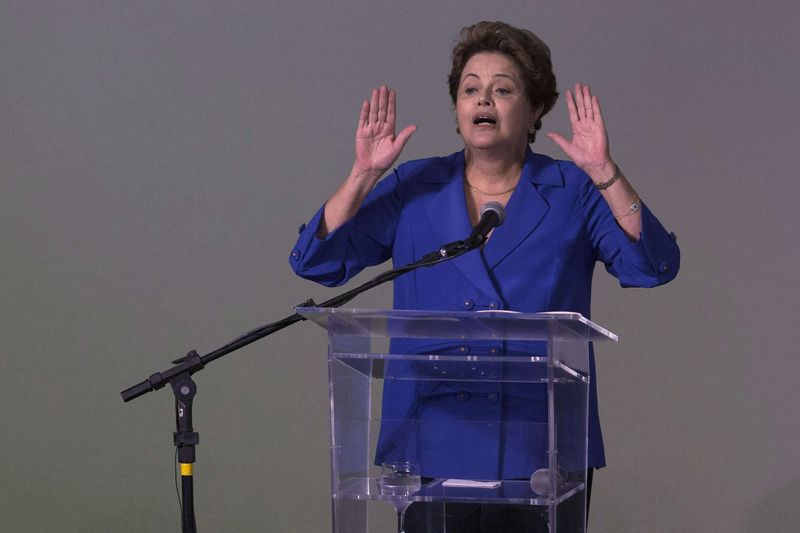By Brian Winter
SAO PAULO (Reuters) - As a young Marxist in the early 1970s, Dilma Rousseff was jailed, hung upside down and tortured with electric shocks to her feet, head and breasts by Brazil's military dictatorship.
Yet today, as president, Rousseff is refusing to take steps forcing military officers from that era to face prosecution for such abuses, believing Brazil's hard-won democratic stability matters more than her personal beliefs or past.
Her stance has disappointed some activists who believe they are closer than ever to putting leaders of the 1964-85 dictatorship, and those who aided them, on trial.
Unlike in other countries like Argentina or Chile, Brazil's Cold War-era soldiers have never faced punishment for human rights crimes.
Past abuses have again become part of the public debate because of Rousseff's own actions. A "truth commission" she appointed in 2012 to shed new light on the dictatorship's crimes is due to present its findings to her on Wednesday in Brasilia.
The report will contain new information on the more than 300 people who were killed by the dictatorship, as well as cases in which private companies helped the military identify leftist activists, according to Rosa Cardoso, one of the truth commission's leaders.
The commission will also recommend that a 1979 law granting soldiers amnesty for most abuses be overturned, or otherwise circumvented, so that trials may go forward.
"The truth isn't enough," Cardoso said. "We want justice."
The military passed the amnesty, which also covered crimes committed by leftist groups, as part of a long, carefully negotiated transition back to democracy. Getting around it would likely require either a decision by the Supreme Court or the passage of new legislation, Cardoso and legal analysts say.
However, a bill that would modify the law has been stuck in Congress because of a lack of political support.
Rousseff resisted pressure from leftists in her own Workers' Party to make changing the amnesty law part of her re-election campaign platform earlier this year. Even now, with victory in hand and a new term starting on Jan. 1, she will not support the cause, her aides say.
"She sees it as a purely judicial case," one of Rousseff's senior aides told Reuters.
Asked about the president's personal opinion on seeing soldiers held accountable, given her own past, the aide replied: "She won't comment on that. Her feelings don't matter."
EVOLVED OVER TIME
Rousseff's stance is due in part to Brazil's modern-day challenges. With the economy sputtering under her watch and a huge corruption scandal involving her party and state-run oil company Petrobras, aides say she has little appetite for opening up a new, highly contentious battlefront.
Yet the unique way that Brazil dealt with its past has also made public support for prosecutions dubious.
Brazil's generals have little direct influence on politics these days, and its democracy is one of Latin America's most robust. But polls indicate that Brazilians never turned against the military en masse the way Argentines did, for example, in part because the dictatorship here killed far fewer people.
While Rousseff, now 66, evolved over time into a more moderate socialist, her militant past has sometimes been a liability in her political life.
She has only occasionally spoken about her time in jail, wary of inflaming Brazil's large bloc of anti-leftist voters, who often call her a "terrorist" in social media.
Even in private conversations with the truth commission, Rousseff has never mentioned her own past.
"She doesn't have to," Jose Carlos Dias, one of the probe's leaders, said last year. "We all know what she went through."
Rousseff's two predecessors as president were also leftists who suffered oppression by the military, but they emphasized consolidation of democracy over redressing past crimes.
In a speech in March, Rousseff said she "recognises and values the political pacts" that allowed civilian rule to return - in what aides said was a statement of support for the amnesty.
Cardoso argues the law was not a pact but a "self-amnesty" that was found invalid in a 2010 ruling by the Inter-American Court of Human Rights. Still, she understands Rousseff's stance.
"Dilma's problem is that she participates in a political game. She has to assure governability," Cardoso said.
Other paths to lifting the amnesty appear difficult. The Supreme Court rejected a challenge to the law in 2010. A leading justice, Marco Aurelio Mello, said in an interview published Monday that he considered the law a "page that has been turned."
Maria Laura Canineu of Human Rights Watch, an advocacy group, said some victims' families were still hoping for a stronger sign from the president.

"I don't think her support is absolutely essential" to prosecution going forward, Canineu said. "But, when you think about who she is, some certainly wish for more."
(Reporting by Brian; Editing by Kieran Murray)